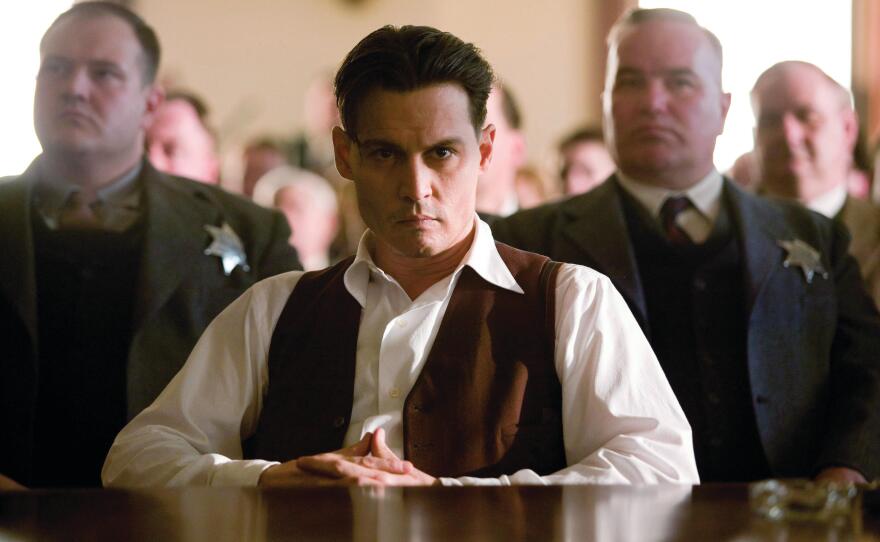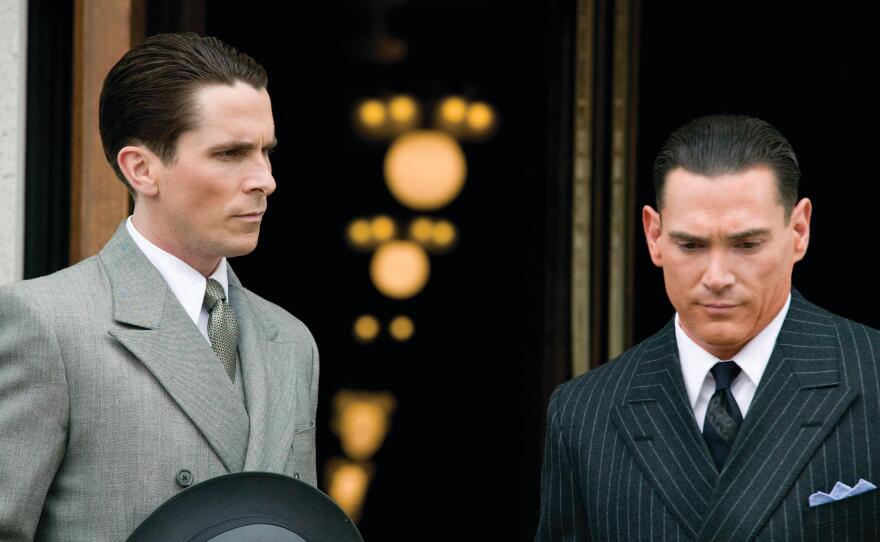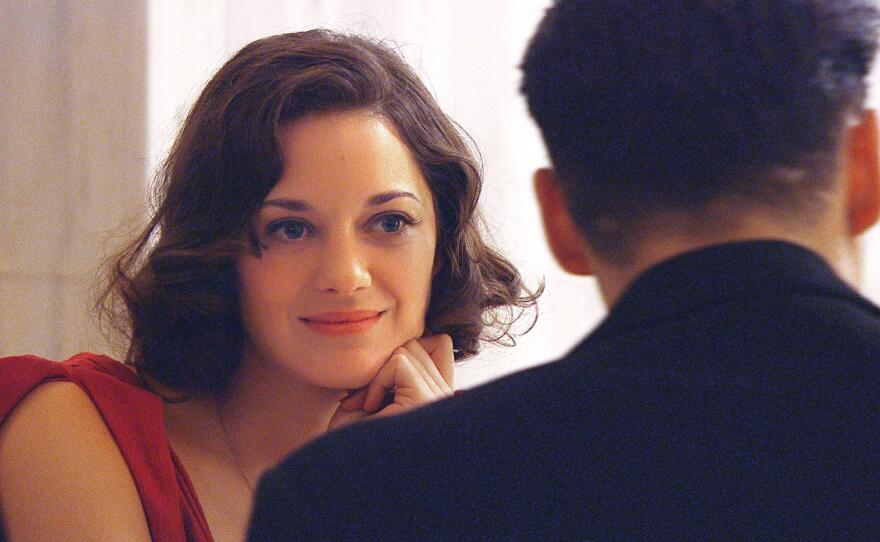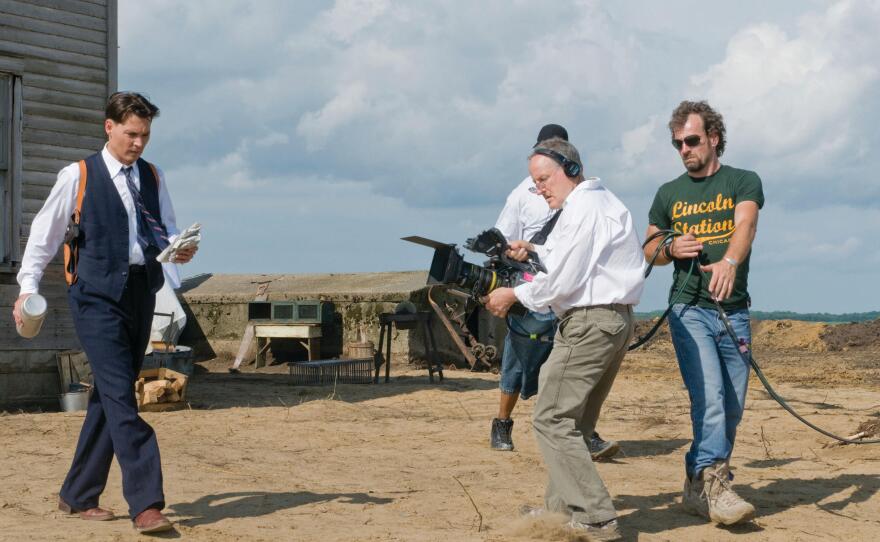Dillinger has been a popular subject for movies. The best film to date has been the 1970s John Milius one called "Dillinger" that starred Warren Oates as public enemy number one and Ben Johnson as FBI agent Melvin Purvis who led the investigation to capture him. Now Johnny Depp stars as the Depression-era criminal in Michael Mann's "Public Enemies" (opening July 1 throughout San Diego).
Michael Mann and Johnny Depp teaming up for a period crime story sounds great. The era of public enemies has fueled many a great gangster film starting with works like "Public Enemy" and "Scarface" (both made in the very decade when people like Dillinger were topping the public enemies list) and continuing through the decades with films such as "Bonnie and Clyde" (1967), "Dillinger" (1973) and "The Untouchables" (1987). Mann has proven himself a great stylist with TV shows like "Miami Vice" and "Crime Story," and films such as "Manhunter" and "Thief." So letting Mann loose on a 1930s crime story with the yummy Johnny Depp as folk hero bank robber seemed too good to be true.

The film is loosely based on the book "Public Enemies: America's Greatest Crime Wave and the Birth of the FBI" by Bryan Burrough. But while the book looked to Dillinger, Bonnie and Clyde, Baby Face Nelson, Pretty Boy Floyd, and Alvin Karpis as well as J. Edgar Hoover and Melvin Purvis at the newly formed FBI, the film narrows its focus to essentially one public enemy, Dillinger. Some of the other criminals make guest appearances but none is featured.
Working from a script by Ronan Bennett and Ann Biderman, Mann begins with a daring prison break. Dillinger (played by Johnny Depp) busts out some criminal co-horts and sets off on a crime spree involving multiple bank robberies and murders. But like Bonnie and Clyde, Dillinger is depicted as a kind of folk hero who allows customers at the bank to take their money because he's "here for the bank's money not yours.". He might not be a Robin Hood redistributing the wealth, but like the common folk he harbors no affection for the greedy banks that were seen as part of the problem with the country's bleak economic conditions in the 1930s. Hmmm? Sound familiar? In a sense, Dillinger is the perfect kind of criminal to highlight in the current economic climate and his choice of banks as his victims taps into a current frustration most people feel toward financial institutions. Maybe that's why Mann opens the film with a graphic calling 1933 "the golden age of bank robbery."

Mann follows Dillinger on his exploits and then brings in J. Edgar Hoover (Billy Crudup) and Melvin Purvis (Christian Bale) as the law enforcement figures trying to track him down. Hoover is in the midst of launching the FBI and moving law enforcement into a modern age of forensic evidence. He's also beginning to use wiretaps and showing a willingness to, as he puts it, "take off the white gloves." This means some brutal interrogations that again seem to comment on more recent government policies about the lengths to which it is appropriate to go in order to get information. Hoover was dealing with a crime wave while the Bush administration was waging a war on terror, but both reveal a chilling eagerness to bend the law in order to fight the bad guys.

In the case of "Public Enemies," Purvis doesn't seem too pleased with Hoover's methods. He doesn't like roughing up suspects or withholding medical attention from them. Purvis also seems unimpressed with the young Ivy League recruits Hoover favors, young men who seem to have little experience and make repeated errors in the field. But if you know history, you know that ultimately the FBI wins out and the public enemies end up dead or in jail.
"Public Enemies" looks great and captures the feel of Depression-era America. The shootouts are also well handled with the old school Tommy guns lighting up the night and crackling with loud staccato rhythms. The shootouts harken back to the old Warner Brothers gangster films. But "Public Enemies" isn't stylish enough to turn its style into substance, nor does it develop its characters in enough depth to make this a compelling drama. It doesn't have the fun of Mann's "Crime Story" TV show, yet it doesn't have the narrative pull of "The Insider." So it ends up as a rather joyless action film that can't quite decide on its point of view.

Mann hints at a number of interesting things that don't fully pay off. There's the triangle of Hoover, Purvis, and Dillinger. Hoover comes across as obsessed with catching Dillinger, and Purvis seems caught between his boss' obsession and wanting to justly administer the law and capture a dangerous criminal. But Bale's performance makes Purvis look continually constipated and unhappy. Depp's Dillinger does some taunting but this film never develops into the kind of cat and mouse pursuit that could make it more dynamic.

"Public Enemies" also throws in a love interest. Marion Cotillard (who won an Oscar for playing Edit Piaf in "La Vie En Rose") plays Dillinger's girlfriend Billie. Cotillard shows some spunk as Billie and plays nicely off of Depp's Dillinger. She's doesn't have quite the spark of some of the actresses from the 1930s (like Joan Blondell, Jean Harlow) but she delivers a solid performance. Depp romaticizes Dillinger -- how could he not. The fact that Mann turned to a Hollywood star like Depp (Leonardo DiCaprio had also been discussed as the star at one point) signals where Mann's sympathies lay and that he wasn't looking for a gritty depiction of the infamous bank robber and murderer. But Depp tries to invest him with some humanity. Bale fares less well but then the part of Purvis is underwritten. Bale's Purvis is grim
The film also raises questions about fame and celebrity. Hoover has a publicist, and Dillinger doesn't want to kidnap anyone because "the public doesn't like kidnapping," and Dillinger has to hide amongst "the public." They are both depicted as men aware of how they are perceived and how they want to be perceived. Mann has a wonderful pair of scenes toward the end of the film that play on this. In one scene Dillinger watches Clark Gable's gangster in the movie "Manhattan Melodrama." The character is both a romanticized image of the gangster and one that taps into a certain truth about how it all will end. There's also a scene – probably not based in fact – in which Dillinger walks into the FBI offices to see all the manpower devoted to tracking him down. He seems to derive a certain pleasure from all the attention even though he also seems to realize that he's likely to be caught or killed. The notion of celebrity and the folk hero status sometimes given to Dillinger are aspects of the story that could have been played up to good effect.

"Public Enemies" (rated R for gangster violence and some language) is worth seeing if you are a fan of either Michael Mann or Johnny Depp. It's flawed but still has enough going for it to make it a good watch. But there are just so many talented people involved that you may leave feeling that it could have been a lot better. Milius' "Dillinger" is still the best film on the man (the worst was the TV movie with Mark Harmon), and "Bonnie and Clyde" is the best gangster bio pic of that era. Of course if you want the real deal you have to go back to those classic Warner Brothers gangster films of the 1930s. Films like "Public Enemy," "Scarface," and "Little Caesar" still feel fresh and crackle with an unmatched energy.
Companion viewing: "Bonnie and Clyde," "Dillinger" (1973), "Public Enemy" (1930), "Manhattan Melodrama"






